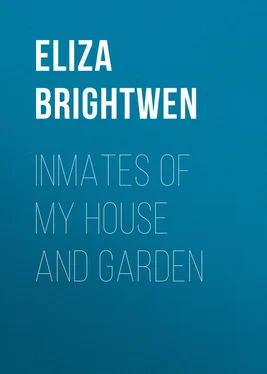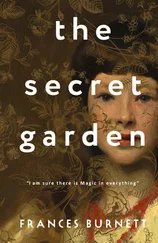Eliza Brightwen - Inmates of my House and Garden
Здесь есть возможность читать онлайн «Eliza Brightwen - Inmates of my House and Garden» — ознакомительный отрывок электронной книги совершенно бесплатно, а после прочтения отрывка купить полную версию. В некоторых случаях можно слушать аудио, скачать через торрент в формате fb2 и присутствует краткое содержание. Жанр: foreign_antique, foreign_prose, на английском языке. Описание произведения, (предисловие) а так же отзывы посетителей доступны на портале библиотеки ЛибКат.
- Название:Inmates of my House and Garden
- Автор:
- Жанр:
- Год:неизвестен
- ISBN:нет данных
- Рейтинг книги:3 / 5. Голосов: 1
-
Избранное:Добавить в избранное
- Отзывы:
-
Ваша оценка:
- 60
- 1
- 2
- 3
- 4
- 5
Inmates of my House and Garden: краткое содержание, описание и аннотация
Предлагаем к чтению аннотацию, описание, краткое содержание или предисловие (зависит от того, что написал сам автор книги «Inmates of my House and Garden»). Если вы не нашли необходимую информацию о книге — напишите в комментариях, мы постараемся отыскать её.
Inmates of my House and Garden — читать онлайн ознакомительный отрывок
Ниже представлен текст книги, разбитый по страницам. Система сохранения места последней прочитанной страницы, позволяет с удобством читать онлайн бесплатно книгу «Inmates of my House and Garden», без необходимости каждый раз заново искать на чём Вы остановились. Поставьте закладку, и сможете в любой момент перейти на страницу, на которой закончили чтение.
Интервал:
Закладка:
I AM often envied as the possessor of one of the most charming bird-pets it is possible to imagine.
“Fairy” is a tiny whitethroat, a sleek, delicate, grey-coloured bird with a white breast, lovely in form, swift in flight, and of most engaging disposition.
I met with it in this wise. A plaintive little cheeping sound attracted my attention one morning at breakfast-time, and looking outside the window, I saw a tiny, half-fledged bird sitting on the ground, looking pitifully up at me; it pleaded its hungry condition with open beak, and seemed to have no fear at my approach. Of course such a poor little motherless waif must be cared for, so I brought it in, and it received very readily the provender I offered it.
I never saw such a tiny, quaint-looking piece of bird-life. Its little throat-feathers were beginning to show on either side like a small white cravat; it had about half an inch of tail, and minute quills all over its body gave token of coming feathers. The delightful thing about it was its exceeding tameness; it would sit on my finger and gaze at me with a contemplative expression; no noise frightened it; it was quite content with life in a basket, or on the table, and therefore it became my constant companion, and has grown to be very dear to me and to a wide circle of friends.
Fairy’s advent was in July, and for the first month the early morning feeding was no small care; but love makes all things easy, and at last my small charge could feed itself, and had learnt the use of its wings.
Daily baths were taken in my soap-dish, which was amply large enough at first, but now Fairy is promoted to the sponge basin, in which she flutters to her heart’s content and dries herself afterwards by swift flights about the room. The bath over, the next thing is to search for flies on the window-panes or on the floor; these are snapped up as great dainties, and in this way Fairy greatly promoted my comfort all through the heat of August and September, 1893, by keeping my room free of winged insects.
I have only to take Fairy on my finger and direct her attention to a fly on the ceiling, when off she darts, like a hawk after its quarry, and the fly disappears like magic.
I was once much amused to watch her day after day eyeing a large spider in the corner of the room. She evidently considered very deeply whether she could tackle it; it was large and she was small, and for three days she hesitated; but at last her courage was equal to the enterprise, and the spider was seized, minced up, and eaten. My tiny pet lives on grapes, lettuce, flies, meal-worms, and, as great indulgences, cream and sugar; a tin of special bird-food supplies other items of diet. Fairy is in and out of her cage all day, and but for fear of accidents she might have the range of the house, so confident am I that she would not wish to stray from her happy home. Still, she loves an expedition, and once, having flown after me into the hall, I did not see her again for an hour or more; a hunt was needful, and after searching every room she was at last discovered cheerfully investigating the boxes in a lumber-room at the very top of the house.
I never knew such a clever, fearless little bird. She will put her small body into every corner in search of information; she visits all my friends in turn as they sit at luncheon, pulls their hair, sits on their fingers, tugs their dresses, and is, of course, universally beloved.
I was curious to note whether Fairy would grow restless when the migrating season began, but her abnormal life indoors has so altered her natural instincts that she makes herself quite happy throughout the autumn, and we are truly glad that we are not called to bid adieu to such a lovable companion.
Very naturally some readers may ask, “How can they obtain a tame, happy little pet bird such as my whitethroat now is?” I can only reply, such a thing is not to be bought (or very rarely) for any amount of money, but can be attained by any one who will bring up a young fledgling from its earliest youth, with never-failing love and gentleness. There is no secret about it; it is not a gift bestowed on some and withheld from others, as many seem to suppose, judging from the number of times I have been told, “Oh, you have the gift of taming creatures.” I always disclaim the assertion and tell the simple truth, that just as you seek to win the heart of a child by invariable and patient kindness, so these innocent dumb brethren of ours yield us their devoted love if they meet with similar treatment at our hands.
We must not begin the task of bringing up a young bird without counting the cost beforehand. It means rising every morning between four and five, and having little sleep afterwards, for we must imitate the self-denying industry of the mother-bird in providing food for her young ones. If we look out over the dewy lawns at daybreak in spring and summer, we shall see thrushes, blackbirds, robins, and many other birds all actively engaged in searching for worms and insects to supply the needs of their respective families. All through the day we must think of the tender creature we have undertaken to rear, giving it every half-hour as much food as it desires, and keeping it warmly covered from cold and draughts, lest its limbs should be attacked by cramp.
This ailment seems incurable, and is the cruel fate of most fledglings that are brought away from their parents, because people forget that the warmth of the mother-bird is essential to the life of the callow brood, and I, for one, never promote the rearing of young wild birds unless, as in the case of a motherless waif like my Fairy, we try to save a little innocent life by doing what we can to imitate its natural bringing up. Absolute tameness can only be attained by unvarying gentle treatment. Never has Fairy heard a harsh word, or, as far as I know, has she had a fright of any kind.
A single grip of Mungo’s cruel little jaws would end her life in a moment, but Fairy does not know it, and she sings on fearlessly as he passes her cage. I believe she would act as a certain much-petted little dog used to do when his mistress pretended to scold him severely; he would look about eagerly to see where the wicked animal addressed could be that he might fly at him. I tried to speak seriously to my small bird one day when she was particularly in my way, but she only gave me several hard pecks, and to my great amusement fought me with her tiny claws much as a gamecock would use his spurs. Fairy has the curious habit, which I have noticed in many small birds, of turning rapid somersaults by way of exercise, springing from a perch on one side of the cage up to the roof, turning over and coming down on her feet like a born acrobat.
It is curious to be able to see human passions manifested in such a tiny creature as my whitethroat, and it can rarely be seen , because it is very seldom that a bird is so absolutely tame as to feel free to show itself as it is in reality – fear being the dominant feeling in most captive birds – and that leads to the incessant fluttering and effort to escape, which hinders character from being shown.
When Fairy is out of her cage, if I open a drawer she is certain to show curiosity , and flies into it, hops about in her perky way, pecking at one thing and another to find out what each is, her beak being equivalent to a hand, and the only instrument with which she can do anything. I put some delicacy on my finger, and then she comes, and by her actions and low chirping she shows pleasure .
Before long, her sweet warbling song expresses contentment , her little sky is serene and clear, all her wants are provided for, she has no cares for the morrow, and her happy little nature comes out in cheery songs.
She picks a scarlet flower petal, and I am not sure but it may be poisonous and bad for her, so, like a careful mother, I take it out of her beak. Then comes unmistakable anger ; she scolds and pecks at my fingers, and wilfully tries to get the flower petal back again.
Читать дальшеИнтервал:
Закладка:
Похожие книги на «Inmates of my House and Garden»
Представляем Вашему вниманию похожие книги на «Inmates of my House and Garden» списком для выбора. Мы отобрали схожую по названию и смыслу литературу в надежде предоставить читателям больше вариантов отыскать новые, интересные, ещё непрочитанные произведения.
Обсуждение, отзывы о книге «Inmates of my House and Garden» и просто собственные мнения читателей. Оставьте ваши комментарии, напишите, что Вы думаете о произведении, его смысле или главных героях. Укажите что конкретно понравилось, а что нет, и почему Вы так считаете.












